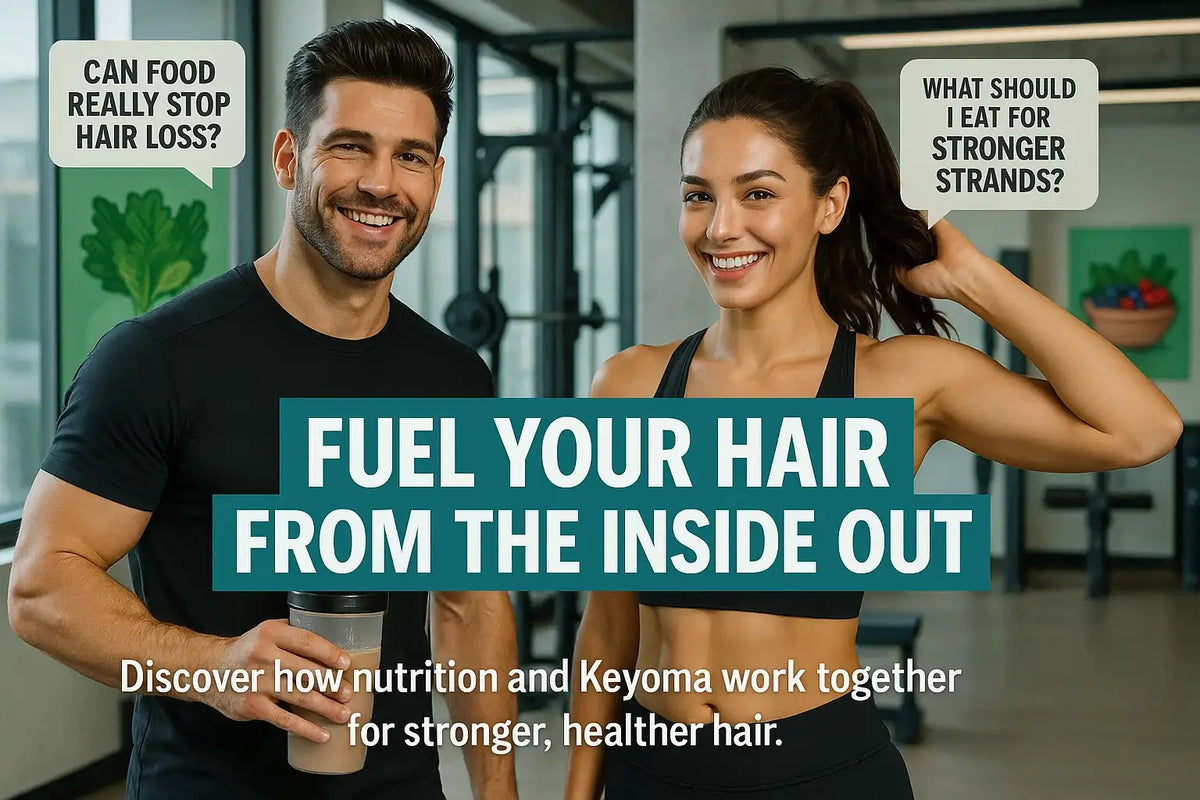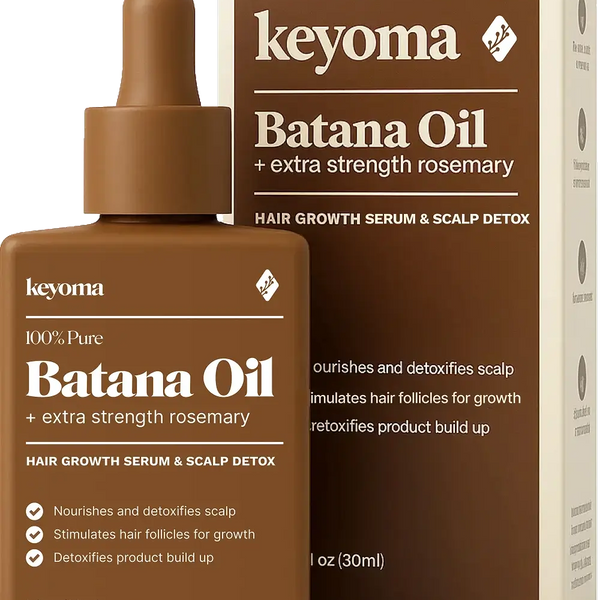In this article
Genes, stress, and health issues often drive hair thinning and shedding, but your diet affects your strands, too. Certain foods may weaken hair and speed up loss, while others support growth and reduce breakage.
If you want to keep your hair thick and strong, you need to know how food choices influence scalp and follicle health. In this article, Keyoma’s hair restoration team breaks down which foods may cause hair to fall and which ones may help prevent it.
How Nutrition Affects Hair Growth and Shedding
Hair loss, medically known as alopecia, affects many people for various reasons.
Common triggers include:
-
Inherited traits
-
Hormone imbalances
-
Thyroid disorders
-
Repeated pulling on strands
-
Injury
-
Infections
-
Cancer treatments like chemotherapy
Your diet can also influence shedding, especially when lacking vital nutrients or overusing supplements.
Hair has two parts: the visible strand (shaft) and the root (follicle) beneath the skin. Growth happens at the follicle.
On average, hair grows about 0.35 mm daily. You can shed around 100 strands each day — even more with regular washing or brushing.
Hair follicles work fast and respond quickly to changes in the body. Since these cells divide rapidly, lacking key nutrients can disrupt growth and lead to thinning.
Iron
Iron deficiency ranks as the most widespread nutrient shortfall worldwide and often triggers hair shedding.
This lack connects to telogen effluvium (TE), a condition where the hair growth cycle breaks down and causes excess strand loss.
Experts continue to study how low iron levels affect hair, but current evidence suggests the body redirects stored iron away from follicles to support other vital functions.
Research shows that people with thinning hair frequently have reduced iron levels in both their blood and strands compared to those without hair loss.
Vitamin D
Vitamin D supports hair growth and keeps follicles healthy.
Studies show that people with hair loss—such as female pattern thinning or alopecia areata—often have lower vitamin D levels.
Some research found that taking vitamin D supplements helped certain individuals regrow hair linked to this deficiency.
A 2020 study of 109 participants revealed that those with thinning hair had much lower vitamin D in their blood than those without. Around 80% of those with hair loss showed a deficiency.
Low iron also appeared frequently in these individuals.
Based on these results, researchers advised screening for vitamin D and iron levels in anyone dealing with widespread hair shedding.
Zinc
Zinc supports immune response, cell growth, and protein formation.
Your hair follicles rely on zinc to function properly. It helps prevent shrinkage, supports growth, and aids follicle repair.
A lack of zinc can lead to hair shedding. Research shows that people with thinning hair often have lower zinc levels than those without hair issues.
This includes individuals with:
-
Male pattern baldness
-
Female pattern thinning
-
Telogen effluvium (TE)
Other Nutrients Linked to Hair Loss
Studies have linked low levels of several other nutrients to hair thinning and excessive shedding. These include:
-
Copper
-
Biotin
-
Vitamin B12
-
Folate
-
Riboflavin
Multiple triggers can lead to hair loss. A shortage of one or more of these nutrients often plays a role.
Can a Poor Diet Cause Hair Loss?
Many people overlook how diet affects hair health, but poor eating habits often lead to shedding. Your body reacts strongly to missing nutrients. When you fall short on essentials, your hair may stop growing and begin to thin.
Extremely low-calorie diets or plans that cut out entire food groups often trigger hair loss through nutritional gaps. Rapid weight loss can also shock your system and cause temporary hair shedding. The good news is hair typically returns once you restore key nutrients and ease physical stress from fast weight loss.
Foods That May Contribute to Hair Loss

Too Much Sugar
Eating too much sugar can spike your insulin levels, which throws off hormones like androgens. When androgen levels rise, they can shrink your hair follicles and trigger thinning or hair loss. High sugar intake also promotes scalp inflammation, which can disrupt healthy hair growth.
Refined Carbs
Eating refined carbs like white bread, pasta, and pastries can rapidly raise your blood sugar. This insulin surge can boost androgen levels, which harms hair follicles and leads to thinning or shedding.
Fried Foods
Eating greasy foods like fried items can disrupt your scalp’s oil balance. Excess oil can block follicles and trigger hair shedding. These foods also promote inflammation, which may slow hair regrowth.
High-Mercury Fish
Fish like mackerel, swordfish, and certain tuna contain high mercury levels. Too much mercury can upset your body’s protein balance and trigger hair thinning.
Discover the best hair loss treatments
Artificial Sweeteners
Artificial sweeteners like aspartame have been linked to hair shedding. While researchers need more data, some studies suggest aspartame might harm hair follicles and trigger thinning.
Processed Foods
Heavily processed items like frozen meals, packaged treats, and fast food often miss key nutrients and contain high amounts of salt, sugar, and bad fats. Eating them regularly can lead to poor nourishment, which weakens hair and increases shedding.
Excessive Alcohol
Drinking alcohol in excess drains your body of fluids, which weakens your hair’s structure. Dry strands break more easily. Alcohol also lowers levels of vital nutrients like iron and zinc—both needed for strong, steady hair growth.
Eating nutrient-dense meals with leafy greens, lean meats, and vitamins B and C helps your hair grow thicker and stronger.
What to Eat for Stronger, Healthier Hair

Spinach
Spinach supplies iron, a key mineral that supports hair strength. Low iron levels, or anaemia, often trigger shedding. Spinach also produces sebum, a natural oil that keeps strands soft. It contains omega-3 fatty acids, magnesium, potassium, and calcium—nutrients that help preserve scalp and hair health.
Eggs
Eggs provide biotin, a B-vitamin needed for growing and strengthening hair. Low biotin levels often lead to thinning. Eggs also deliver protein, which builds hair structure, and zinc, which aids growth and repairs damaged strands.
Nuts and Seeds
Almonds, walnuts, and flaxseeds supply omega-3 fats and vitamin E, which support scalp health and encourage hair growth. Vitamin E especially improves blood flow to the scalp, helping to reduce shedding and strengthen follicles.
Discover the benefits of Batana oil
Sweet Potatoes
Sweet potatoes contain high levels of beta-carotene, which your body turns into vitamin A. This vitamin supports cell development, including the formation of new hair. It also aids in producing sebum, the natural oil that keeps the scalp moisturized and prevents hair from becoming dry.
Avocados
Avocados provide beneficial fats such as omega-3s and vitamin E, which support scalp function and hair strength. Their antioxidants shield both scalp and strands from harm, encouraging thicker and sturdier hair development.
Greek Yoghurt
Greek yoghurt delivers a strong dose of protein, a key component in hair structure. It also supplies vitamin B5 (pantothenic acid), which boosts blood circulation to the scalp and supports strand growth. Eating Greek yoghurt regularly can help reduce breakage and limit thinning.
Berries
Strawberries, blueberries, and raspberries contain high levels of vitamin C and antioxidants. Vitamin C supports collagen formation, which reinforces hair shafts and limits breakage. Antioxidants defend hair roots against free radical damage, helping preserve follicle strength and strand health.
Lean Meats
Chicken and turkey provide plenty of protein and iron. Protein supports the structure of each strand, while iron boosts blood flow to the scalp. Better circulation helps follicles absorb oxygen and nutrients, which encourages strong and steady hair growth.
Keto Diet and Hair Loss
Your body normally burns carbohydrates for fuel. But when you follow a high-fat, low-carb keto diet, you enter ketosis—where your body shifts to using fat for energy instead of carbs.
This shift can impact your hair. Two common triggers of hair thinning during ketosis include:
Reduced nutrient intake: Cutting carbs means you likely eat fewer fruits and vegetables. This limits your variety of vitamins and minerals, which are essential for strong, healthy hair. The result can be slower growth or increased shedding.
Lower calorie availability: When you eat fewer calories, your body directs energy to essential functions like organ performance and cell repair. Hair growth falls lower on the priority list, leading to weaker strands or more fallout.
Explore how to regrow your hair
Carnivore Diet and Hair Thinning
A carnivore diet centers around meat, which supplies high amounts of protein—an essential element in building and maintaining hair.
Since hair consists mainly of keratin, a protein, meeting your daily protein needs is key to supporting strong strands. This meat-heavy approach also includes fatty acids like omega-3s, which may improve scalp moisture and protect hair shafts.
Animal-based meals also deliver critical vitamins and minerals for hair health. Nutrients such as iron, B12, and zinc help fuel hair growth and repair tissue damage. When consumed in proper amounts, these nutrients may reduce shedding and boost hair strength.
-
Iron: Promotes growth and is especially concentrated in red meats
-
Vitamin B12: Helps form healthy cells and is abundant in animal-based foods
-
Zinc: Supports scalp repair and appears in meats and shellfish
Which Diet Supports Hair Health Best?
Eating nutrient-rich foods helps you maintain strong, glossy hair and avoid excessive shedding. If your diet lacks specific vitamins or minerals, your hair may weaken or fall out.
Omega-3 fatty acids are essential for scalp health, hair resilience, and skin support. Include these omega-rich options in your daily meals:
-
Fatty fish: salmon, tuna, mackerel
-
Plant sources: flaxseeds, chia seeds, flaxseed oil, canola oil
-
Nuts and legumes: walnuts, soybeans, tofu
-
Cruciferous vegetables: broccoli, cauliflower, Brussels sprouts
B-complex vitamins—especially B6, B12, and folate—support healthy follicles and hair texture. Vegans and vegetarians may miss out on these.
-
For B6: eat bananas, sweet and white potatoes, and spinach
-
For B12: stick with fish, meat, dairy, and poultry
-
For folate: choose citrus, tomatoes, beans, lentils, and whole grains
You also need enough protein. Hair contains keratin, a protein your body must build from dietary sources. Aim for daily servings of lean protein like chicken, fish, soy, or eggs.
Trace nutrients like zinc, iron, magnesium, and biotin also affect follicle function and scalp balance. Taking a daily multivitamin can help fill any dietary gaps.
Diet impacts your hair, but it’s not the only factor. Hair loss can also result from genetics, thyroid dysfunction, anemia, autoimmune conditions, or hormonal imbalances.
Explore the best vitamins recommended for hair growth
Support Your Hair From the Inside Out With Keyoma
Healthy hair starts with what you eat. While no single food can stop shedding, a balanced diet rich in protein, vitamins, minerals, and healthy fats can support growth and reduce thinning. But nutrients alone don’t always fix the problem.
If you’ve adjusted your diet and still see more hair fall than usual, your follicles may need more targeted support. That’s where Keyoma comes in.
Our natural solutions are designed to work with your body—not against it. Whether you’re dealing with hair loss from stress, hormonal changes, or deficiencies, Keyoma offers plant-based treatments that help restore follicle balance and reactivate growth.
Start with nutrition. Stay consistent. Then strengthen your results with Keyoma.
Featured Product
100% Pure Batana Oil + Rosemary









